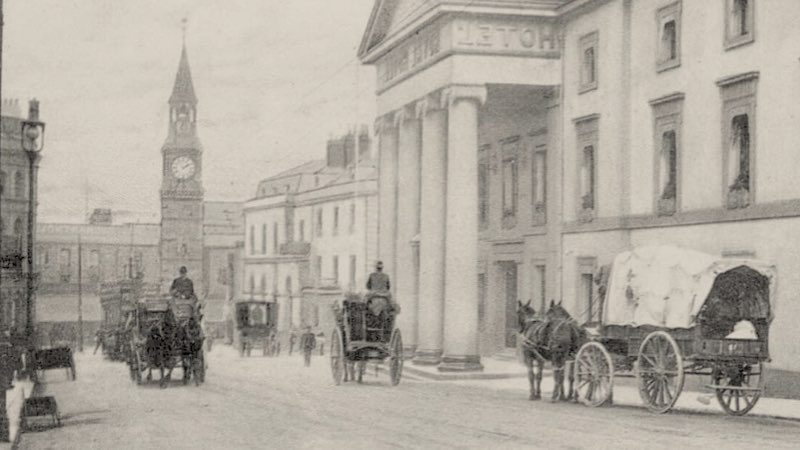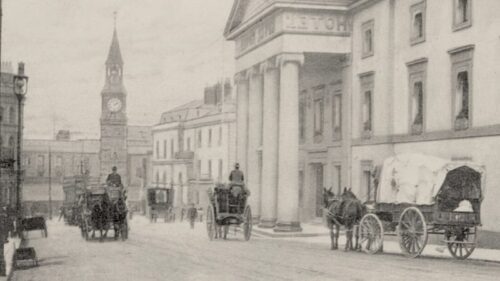
The Nonentity Of Sin
Zion’s Witness 1858: A Witness’s Offering
Among the many servants sent by the Lord into the ministry, few have been made the means “to stablish, strengthen, and settle” the children of God like Arthur Triggs.
We have had good and gracious men “able to admonish,” “of sound speech that cannot be condemned,” and “giving full proof of their ministry but, without derogating other men’s labours, to Arthur Triggs especially God has, in His wisdom, love, and faithfulness bestowed His good Spirit for the edification of the household of faith, “building them up in their most holy faith.”
I am aware that many will object even to the bare mention of his name, and among them some of God’s own family. It will be as well, therefore, before entering on the use which God has made of him to His people, to consider some of the objections raised against his preaching.
The “railing accusations” of professors of all kinds are but as cause and effect: the gospel is preached, and they are offended in Him; for “These speak evil of those things which they know not.” But “to them who have obtained like precious faith,” I would say, “Beware lest any man should beguile you with enticing words.” Some whom I love in the truth, misunderstanding words and meanings, have earnestly warned their hearers of “pernicious ways”, but of whom it may be said, “No doubt ye are the people, and wisdom shall die with you.” Others, again, have used invectives, and applied every fleshly effort to bring into disrepute “the mason.” Contented as many of them have been, with hear-say, they have lacked the intelligence of the high priest, who asked, “Are these things so?” he has been called “Presumptuous wretch,” “dangerous fellow,” but I must not expose their foolishness, lest their spiritual minds should be hurt; suffice it to say, they have been wanting in the worldly sagacity of Gallio, when he said, “If it be a matter of words and names and of your law, look ye to it, for I will be judge of no such matter.” Mr. Triggs might say, “But I would ye should understand, brethren, that the things which happened unto me have fallen out rather unto the furtherance of the gospel for many men labouring to dissuade, have been, unwittingly, the means of their people going to hear “Jesus only.”
The word “Nonentity” has, perhaps, created greater indignation than any word ever coined. Now, if it were an innovation, it might be said, “reason would that I should bear with you;” but it is one of the commonest words in the English language. It is said, too, by some, that the word is unscriptural. If, before objecting, they would but take the trouble to compare “words,” it would be found to be perfectly scriptural, simply meaning a thing that does not exist. If, too, they would candidly compare what they so frequently utter with the meaning of this word, they must pronounce them to be nothing more or less than synonymous. What meaning do they attach to these expressions? “Sin is for ever put away:” “Christ suffered for sin once.“ “The church is everlastingly saved?” Do they not imply that sin, as standing before God and His people, is a nonentity? Why, the precise meaning is enforced by those who reprobate the word.
There are two motives to be discerned in making remarks about others. One is in soberly weighing the pro and con, and so arriving at a proper conclusion; the other is, in giving vent to mere prejudice and malignity, ably prompted by envy and fleshly zeal. Far be it from me to impute unworthy motives to those children of God who feel constrained to speak of peculiarities or failings; nor can I agree exactly with those who would summarily hush into silence every observation that might be made about a brother with a “I’ve enough faults of my own;” because that seems to savour a little of affectation; and I have found that those remarks have as often tended to establish a man’s character as to deteriorate it in esteem. It is, however, very different when taken up “in the lips of infamy,” and merchandize made of that which ought only to be talked of in the “spirit of love and of a sound mind.” But what has resulted from the malignant opposition? The professors have been fed, who greedily “eat up the sins of God’s people,” while the children of God, by the same means, have been starved. Those having the circumcised heart have then gone to hear “what this babbler saith,” and have come away declaring that he “was a man sent from God.” Yet, in the midst and above all, this deeply-experienced saint has been enabled “to endure as seeing Him who is invisible;” and if some of the children of God preach and write against him, “yet his prayer also shall be in their calamity,” while his soul’s desire is, “That their hearts might be comforted, being knit together in love, and unto all riches of the full assurance of understanding, to the acknowledgment of the mystery of God, and of the Father, and of Christ; in whom are hid all the treasures of wisdom and knowledge.”
It is really humiliating to hear men cavil at truths which have, through the witness of the Spirit, been made a comfort to so many, tempted, tried, buffeted, and devil-hunted souls, who have—
“Found it sweet to feel the same,
Passing tribulation’s flame.”
It is flagrant, too, to read words of very different import added to those which he has said, to suit the miserable cravings of grovelling factious minds. To hear also disputes about a word when the same conclusions are arrived at from different points of view, ought ever to be denounced as vulgar prevarications.
Serious, however, as these things are to reflect upon, they become comparatively little when considering Arthur Triggs as a “servant of Jesus Christ.” Here it is that the opposers become the accusers and impugners of the Holy One of Israel. Arthur Triggs has, by the teachings and leadings of God the Eternal Spirit, “come behind in no good gift,” and has given “full proof of his ministry;” for “in nothing” is he “behind the very chiefest of ”God’s ministers, though he “be nothing,” and contented to be so, “so long as God is glorified in his body and in his spirit which are His.”
It might be contended by some, that undue praise is bestowed upon this minister in particular. I would reply, “ye have compelled me;” “but he ought to have been commended of you.” There is no need for me either to explain or praise; nay, he might with truth say, “Ye are our epistle, written in our hearts, known and read of all men.” However, as a Witness’s Offering, we who have been favoured “to sit before the Lord in His house,” hearing His servant “preaching peace by Jesus Christ, He is Lord of all,” cannot but speak of the things “which we have seen and heard,” and “have handled, tasted, and felt of the good word of life.”
I remember Zion Chapel, where “the word of the Lord had free course and was glorified,” and “the dew lay on my branch,” where “our most glorious Christ” was the theme with both preacher and hearer; where we—
“Wept as pardon’d sinners do.
Felt the blood of sprinkling too.”
It has been said by some, and I would gladly reciprocate it, that there has seldom been such a highly favoured, while, at the same time, deeply tribulated church as the one which “was gathered together” there. This may, on the other hand, be deemed fanciful and exaggerated; but they comprised some of the oldest and most experienced members of the churches about the metropolis. There was this happy coincidence contributed to bring about this result:—a tribulated, persecuted, and despised minister, and an afflicted and oppressed people. Here was the secret of that sweet, spiritual, heart communion which we had one with another; here is the answer to “those who would trouble us and while the verbal or oral communications were so few, we “joyed over” one another “in Christ Jesus,” “knowing no man after the flesh.” Belonging to that “sect which is everywhere spoken against,” this “minister of God” has “not failed to declare unto us the whole counsel of God” “in much patience, in afflictions, in necessities, in distresses, in strifes (for Christ’s sake), in imprisonments (bonds of the gospel), in tumults (among professors), in labours, in watchings, in fastings; by pureness, by knowledge, by long suffering, by kindness, by the Holy Ghost, by love un- unfeigned, by the word of truth, by the power of God, by the armour of righteousness on the right hand and on the left, by honour and dishonour, by evil report and good report.” What shall I more say, for Arthur Triggs dwells in the spiritual affections of multitudes of the children of God, “his companions in tribulation,” who “rejoice in Christ Jesus, and have no confidence in the flesh and wheresoever Jesus is preached in His suitability, and sufficiency to poor sensible sinners, there the self same truths will delight the soul, and those walking “in the liberty wherewith Christ hath made them free,” will “joy in God through our Lord Jesus Christ,” that sin, as standing between their souls and God, isa “Nonentity.”
Samuel
Kentish Town, 31st March, 1859
Arthur Triggs (1787-1859) was a High-Calvinist preacher. He served as pastor for the churches meeting at Trinity Chapel, Plymouth and Zion Chapel, Waterloo Road, London.




